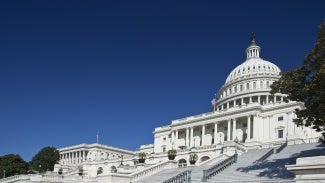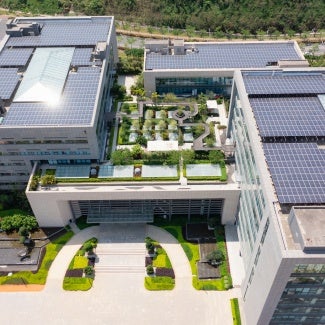Earth Day 2024: Top five ways AIA has advanced climate change
From Capitol Hill to COP28, AIA's Advocacy team stands ready to empower architects to help lead national and global efforts to reduce and mitigate climate change.

Architects are responsible for prioritizing and supporting practical actions to exponentially decelerate the production of greenhouse gases contributing to climate change. The Architects are Environmentally Responsible portion of AIA’s National Policies and Position Statements have been updated to reflect this imperative as we celebrate Earth Day 2024. Designing and constructing buildings that combat the greenhouse gas effect will improve our chances of repairing the planet while creating a healthy, resilient, and regenerative future.
AIA’s Advocacy team continues working for the adoption of meaningful policies and legislation that will lead to a better and more inclusive built environment and calls for architects to be present and engaged. The more architects advocate at the federal level, the more significant the positive impact on our architecture firms, the communities in which we live, work, play, and the profession.
Here are the top five ways AIA has advanced climate action in the last year:
1. Federal Funding
AIA strongly supported President Biden’s efforts through the Inflation Reduction Act and Infrastructure Investment and Jobs Act to bolster funding for programs at the Department of Energy and other agencies that incentivized state and local governments to adopt the latest building codes and programs to incentivize upgrading and retrofitting appliances and HVAC systems in buildings. ·AIA continues to urge Congress to support funding of these projects through the annual appropriations process.
2. COP28: AIA attends the 2023 UN Climate Change Conference
AIA sent an official delegation to COP28 to raise awareness for the building sector, connect with decision-makers and partner organizations, and advocate for policies that support decarbonization and adaptation. ·
3. National Definition of a Zero-Emission Building
AIA submitted comments developed with member feedback in response to the Request for Information issued by the Administration on a National Definition of a Zero Emission Building for Operating Emissions. AIA is committed to aggressively supporting the Administration’s efforts to drive zero emissions goals for buildings.
4. Historic Tax Credit Growth and Opportunity Act
AIA believes the greenest building is one that has already been built and supports the passage of HR 1785/S 639 by Congress. Rehabilitation and reuse of historic properties offer an important alternative to new construction as a strategy to help lower carbon emissions. The federal Historic Tax Credit is also an important economic development tool used to revitalize communities. ·
5. Promoting Resilient Buildings Act
The bill, which AIA supported, was passed unanimously by the Senate Homeland Security and Government Affairs Committee. HR 5473 is now on its way to the full Senate. The bill was passed out of the House of Representatives in December 2023. It will allow AIA members to design resilient building projects that promote health, safety, and welfare and mitigate the effects of natural disasters in their communities using funding obtained by local and state governments through these grant programs.



